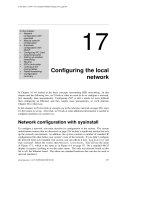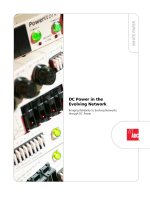Tài liệu DC Power in the Evolving Network pptx
Bạn đang xem bản rút gọn của tài liệu. Xem và tải ngay bản đầy đủ của tài liệu tại đây (169.92 KB, 4 trang )
DC Power in the
Evolving Network
Bringing Reliability to Evolving Networks
through DC Power
WHITE PAPER
DC Power in the Evolving Network
Page 2
The telecommunication network is evolving, and
offering just one service – voice, data, or video – is no
longer an option for providers who want to remain
competitive. Whether the consumer chooses a
traditional telephone company, a cable television
operator, or even an Internet services provider, the trend
is moving toward one entity delivering the complete
package at one competitive price.
This push to drive fiber deeper towards the home with
a variety of fiber-to-the-x (FTTX) architectures is also a
catalyst for this changing telecom landscape. These new
multiple service operators (MSOs) have many critical
decisions to make in building or re-building their
networks to add the missing elements of voice, data,
and video services to offer the “triple play” bundles
consumers demand.
ADC wants to ensure that every telecom service
provider is aware of an easily-neglected consideration
to evolving network architectures – power. Power,
believe it or not, is a definite show-stopper because
without it, the systems fail to operate. Power
malfunctions can lead to equipment damage, fires, or
even personal injuries. As service providers plan their
networks of the future, cutting corners to save capital
expenditures is a common occurrence – but power is
not the place to cut those corners.
Powering for reliability
DC power has always been used for telephony
equipment, and it is evolving with today’s evolving
networks. With infrastructure already in place, powered
by DC, most will make the logical choice to remain with
DC power as they add data and video services to the
network. DC power is the only way to provide the
Telcordia’s 99.999 percent (“five 9s”) uptime
requirement for telephony communications. DC power
also is constant and cleaner while enabling service
providers to maintain a battery backup in the event of a
main failure.
For data and video providers who are intent on adding
voice services, such as voice-over-IP (VoIP), onto a single
transmitted signal, switching to DC power is necessary.
The types of equipment required to support each
service are worlds apart in terms of amperage. But the
best overall choice is DC power for its reliability,
protection, and distribution attributes.
Again, competition in today’s bundled services market
makes 99.999 reliability a critical differentiator.
Customers likely have several choices when it comes to
providers – and disappointed customers can be lost
before a provider even realizes there was a problem. To
gain and retain customers, providers must be able to
turn up new services quickly and deliver equal reliability
for voice, data, and video.
Conversion costs
Several cable television companies are in the midst of
national build-outs, or converged networks, that use
routers to support voice, video, and data by collapsing
all three into one signal for transport. The routers
require high power levels and DC power is the best
choice. Converting their power infrastructure from AC
to DC is a definite cost consideration.
However, although DC requires more initial cost during
installation and uses more real estate, the improvement
to network reliability cannot be overstated. Capital
expenditures must be weighed against the possibility of
higher operational costs down the road. Truck rolls and
technicians are a large part of operational costs so,
simply put, upping the reliability lowers the number of
service calls required.
There are other good reasons for converting
headends, hubs, and nodes to DC power despite the
conversion costs. Future services, including VoIP, video-
on-demand (VOD), and IPTV, will up the ante in terms
of a provider’s ability to quickly add, turn up, and
reliably maintain whatever service bundle each
customer chooses. Problems relating to power in the
new FTTX networks that offer “full suite” services will
simply be unacceptable.
DC Power in the Evolving Network
Page 3
The impact of DC power is immediately apparent if one
considers several attributes:
• DC power is conditioned power, enabling
equipment to run more smoothly and efficiently.
• Systems can be configured for longer standby at
hubs or nodes.
• Since equipment is direct-wired rather than
plugged in, connections are unlikely to disconnect.
• Each piece of equipment can now be
individually fused.
• There is A to B power redundancy to each
individual piece of equipment.
• A DC power plant is easier to monitor.
• Cable management, a huge consideration in FTTX
networks, is more cleanly managed.
Powering the FTTX network
In today’s FTTX architectures, fiber is being driven to the
outer edges of the access network to deliver the
bandwidth required by evolving new applications.
Consumers are demanding much more capacity than
just a few years ago – and will likely require even more
in the future. Several providers are deploying fiber to
the node, or curb, and connecting to existing
architectures for delivery into the home or business.
This requires equipment at each node to convert optical
signals running over the fiber to electrical signals for
transport over the copper, and vice versa. To enable
these conversions throughout the network, DC power
will be required. Why DC? Again, ADC believes it is the
most efficient and reliable means to provide power for
delivering multiple services for the reasons stated above.
Making the conversion
Power is never a no-brainer – not when it comes to
doing the “heavy lifting” for the network. If the power
fails, the network fails. If the network fails, customers
look elsewhere for more reliable service. ADC, a
company with many years of experience in powering
networks, has a few tips for making the conversion to
DC power.
Service providers should pay close attention to the
standards and certifications that exist for power
equipment. Power systems for communications are
some of the most rigorously tested and standardized of
any products. Also, providers should inquire about lead
times in securing the products needed for their
network’s power requirements.
Cost is arguably the most important issue considered,
particularly in designing today’s new FTTX initiatives.
Conversion costs should be viewed not only in terms of
product cost, but also “real estate” costs, replacement
costs, support costs, and even lost revenue in the event
of failed or delayed delivery. Cutting costs is everyone’s
ultimate goal, but if reliability is sacrificed, any savings
will quickly be wiped away.
Finally, service providers should be as demanding about
their power equipment as their customers will be about
the quality of their services. Both have the right to
expect a lot – and failure to deliver on either will put
the ball squarely in the competitor’s court.
ADC Telecommunications, Inc., P.O. Box 1101, Minneapolis, Minnesota USA 55440-1101
Specifications published here are current as of the date of publication of this document. Because we are continuously
improving our products, ADC reserves the right to change specifications without prior notice. At any time, you
may verify product specifications by contacting our headquarters office in Minneapolis. ADC Telecommunications,
Inc. views its patent portfolio as an important corporate asset and vigorously enforces its patents. Products or
features contained herein may be covered by one or more U.S. or foreign patents. An Equal Opportunity Employer
1322765 4/05 Original © 2005 ADC Telecommunications, Inc. All Rights Reserved
Web Site: www.adc.com
From North America, Call Toll Free: 1-800-366-3891 • Outside of North America: +1-952-938-8080
Fax: +1-952-917-3237 • For a listing of ADC’s global sales office locations, please refer to our web site.
WHITE PAPER









